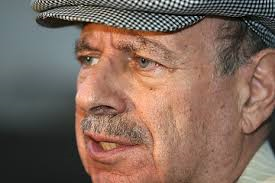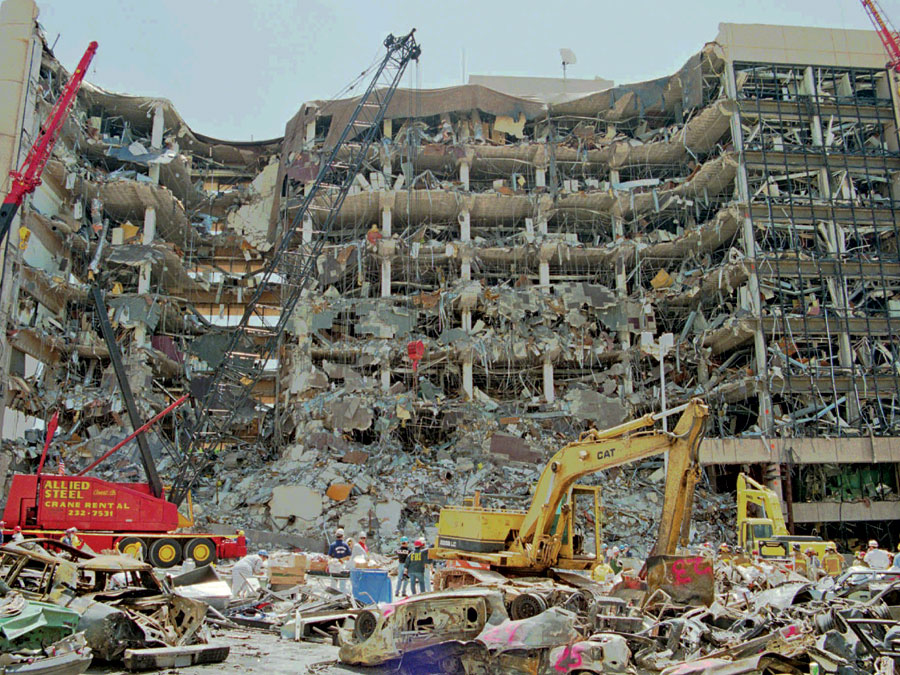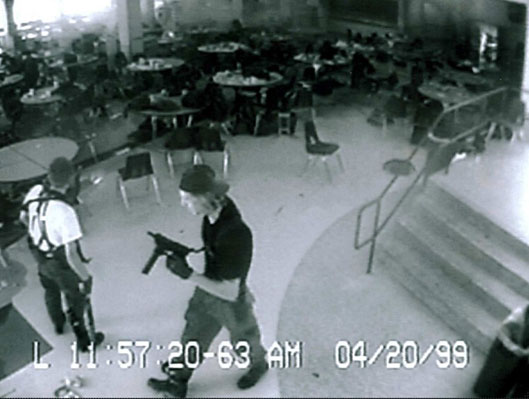www.aljazeerah.info
Opinion Editorials, July, 2016
Archives
Mission & Name
Conflict Terminology
Editorials
Gaza Holocaust
Gulf War
Isdood
Islam
News
News Photos
Opinion Editorials
US Foreign Policy (Dr. El-Najjar's Articles)
www.aljazeerah.info
US Massacres and Mass Shootings:
Produced by the Gun-Worship Culture and Elite Vulgar Capitalism
By James Petras

Al-Jazeerah, CCUN, July 4, 2016
 |
 |
| Oklahoma City bombing, 1995 | Columbine high school mass shooting, 1999 |
Introduction
Over the past fifty plus years, over 125 mass shootings/massacres have occurred within the United States but not one perpetrator has been identified as a trained member of an international Islamist terrorist organization.
A review of the massacres will shed considerable light on the political, cultural and socio-psychological features of US society. The frequent and intensely bloody nature of these mass shootings are a distinctly US phenomenon. The high proportion of fatalities over wounded survivors is a reflection of the availability of high-power weapons in the US and the poorly coordinated police response – where SWAT teams place ‘force protection’ over saving lives.
Method and Scope
Until very recently, civilian-initiated massacres were an infrequent phenomenon in US society up. In order to understand the rise of civilian-initiated massacres as an American phenomenon, we will first set out approximately 20-year time frames, then list the number of massacres in each time period, examine the number of fatalities and the political and social ethos within each time frame. It would be interesting to look at the ratio of fatalities to wounded survivors in order to gauge the effectiveness of the police/medical response.
We can identify three time frames: the early period between 1960-1980; the middle period between 1981-1998; the most recent period between 1999-2016.
Political Dynamics of Massacres
There is a clear and consistent increase in the number of massacres and fatalities over the entire half century. From 1960 to 1980, there was one large massacre resulting in at least 14 fatalities and 32 wounded.
In the subsequent period between 1981-1998 the number of massacres jumped four-fold and the number of fatalities increased four-fold from fourteen to seventy-one.
In the most recent period (1999-2016) the number of massacres almost doubled again and the number of fatalities increased two and a half times.
The number of massacres and victims have ‘taken off’ in the last few years There are grounds to believe that we have moved from massacres as a rarity to a transitional period, to a significant upsurge which has become the ‘new norm’ for mass killings.
Myths : State Propaganda and Social Realities
Large, civilian-initiated massacres were rare (The Texas University Tower in 1967) during the two decades (1960-1980) despite this being a time of mass popular protest against the war and racism, cultural revolts, labor unrest and community-based collective action.
During these tumultuous years, the political-cultural climate encouraged mass collective action directed at changing government policy. Individual political, social and local grievances or psycho-cultural resentments were channeled through well-structured community based organizations. State propaganda was challenged by a widespread system of robust opposition media, well-publicized critical voices and familiar places of revolt. Domestic massacres, when they occurred were more often perpetrated by the State – as in the massacres against the Black Panther leadership, or shooting of students at Jackson State and Kent State Universities.
The growth of civilian-initiated massacres as public events began to find prominence between 1980-1998, a time of growing elite dominance over everyday life and the retreat of collective expression.
This ‘middle’ or ‘transitional period’ was characterized by state and media emphasis on individual justifications and resentments, together with the growing cult of private greed– the ‘animal spirits’ of the market – and the promotion of military revivalism, through Reagan’s invasion of Grenada, and George Bush’s destruction of Panama and Iraq.
The previous political culture, which had absorbed grievances and offered outlets for individual aggression, was in retreat.
The elites, led by President Reagan, established the culture of the ‘Lone Ranger’ (or lone wolf), vindicating grievances with his ‘righteous rifle’. The conflation of the Second Amendment of the US Constitution with the worship of the lone vigilante helped to create the contemporary mass killer.
The political culture of resistance was replaced by the pathology of resentment; protests directed at political targets were replaced by violent terror directed at diffuse apolitical publics – the amorphous innocents.
The transition period established several key determinants that led to the subsequent massification of massacres.
First, the political-cultural elites deliberately and systematically discredited the social context of mass popular protest, ridiculing popular discontent and suppressing dissent while enhancing the image of the power of the individual. The cult of the ‘individual over the collective’ morphed into a deranged Ayn Randian Atlas with his semi-automatic 9 mm.
Secondly, the transitional political culture renewed and enhanced the role of state violence in resolving conflicts and extended the notion of social violence downward into the mass of society.
Under the guardianship of the political and media elites, the 1980’s and 1990’s did not encourage or permit any effective mass cultural alternative to violence.
The deregulation of the economy and the Clinton regime’s open-ended policy of conquest (or ‘regime changes’) through massive bombing of overseas adversaries led to a massive policing of both foreign (imperial clients) and domestic civil societies, which fed into the pathological tendencies of individuals who set out to vindicate their private grievances.
The first two decades of the 21st century witnessed a sharp increase in domestic civilian-initiated massacres with an even greater proportion of fatalities. The cumulative effects of mass murders of previous decades, found expression in a rising spiral of massacres.
The 21st century is the epoch of multiple serial killings at every geographical region, from global, regional, national and local levels. The bloody consequences of lawless imperial wars of aggression and pillage (with such psychotic justifications as ‘regime change’ or ‘humanitarian intervention’ especially under the First Clinton Dynastic Regime) are features of everyday life. Military budgets have skyrocketed at the international and national level and are mirrored by multi-million arms purchases by individuals at the domestic civilian level.
Military metaphysics and quasi-religious public displays of superhuman ‘avengers’ wrapped in the national flag have permeated every cranny of society – from mega-million dollar sporting extravaganzas to school assemblies, business meetings (like the Rotary Clubs) and workplace gatherings.
Millions have entered the war zones; daily police killings of citizens, especially African American and marginalized youth, have become the norm. Meanwhile hundreds of thousands of immigrants are demonized, assaulted, dragged from their homes or workplaces, incarcerated and deported with barely the shirt of their backs – leaving sundered families and communities.
Most important, the US imperial state has brutalized and, directly or indirectly, massacred millions of Muslim civilians, citizens of once-sovereign nations, throughout the Middle East, South Asia, and North Africa and even in the immigrant ghettos, raising lawlessness to a new and more diffuse level.
The pathology of the American state, with its embrace of state-sponsored massacres, has created mass psycho-phobia against Muslim people and is in the process of stirring up the boiling pot of even more brutal civilian massacres. It must be emphasized that American citizens, overwhelmingly non-Muslim, have committed the vast majority of mass shooting in America. Even those mass shooting committed by self-described Islamists have involved US-born Muslims or converts who have shown an affinity and commitment to the dominant gun ethos of America. None have been ‘trained abroad’, none have proved to be ‘soldiers’ of some remote international Islamist movement. Most have learned their requisite ‘skills’ at ‘for-profit’ US shooting ranges and all have imbibed the national gun ideology over community and mass collective action.
Only two of the most recent seven large massacres have a remote link to Islam – and these assassins were not directly related to overseas, organized terrorist groups but had been ‘self-radicalized’ in the context of the individualist US gun culture. Omar Mateen, who massacred scores of unarmed young, mostly Hispanic, people at a gay club in Orlando, Florida clearly had much more in common (spiritually and operationally) with the Norwegian mass murderer, Anders Breivik (who shot and killed over seventy youth at a multi-cultural summer camp in 2011) or with Adam Lanzo (who killed 20 small pupils and 6 teachers in Connecticut in 2012), than with any fighting units in Syria or Afghanistan.
Conclusion
The personal-political grievances of mass murderers have everything to do with their cultural and psychological isolation, resentment and deep spiritual commitment to the dominant arms culture of America: these massacres have become their self-prescribed psycho-therapy. The dominant political and police institutions naturally use these for propaganda to advance the imperial agenda, rather than encourage positive collective expressions of grievances to address social issues.
Today there is no collective social expression with highly credible, committed mass activists as there had been during the 1960-70’s, when large-scale civilian initiated massacres were very rare. The notorious 1967 mass shooting in Austin Texas by a former Marine champion sharpshooter (one shot per kill) was followed by meticulous expert examination of the circumstances and context. Today, there are no political collective or community responses like that of the Texas tower sniper. During the 1980-90’s, the elites encouraged and promoted voracious aggressions against rival markets and whole nations, which the financial press pundits have celebrated as expressions of the ‘animal spirits’, the triumph of the ‘fittest’, most individualistic capitalism. From 2000 to the present, the mass media has saturated its audiences with military solutions to individual grievances. The psychopathology of the mass murderers is reflected in the state writ-large.
***Share this article with your facebook friends
|
|
|
|
||
|
||||||


